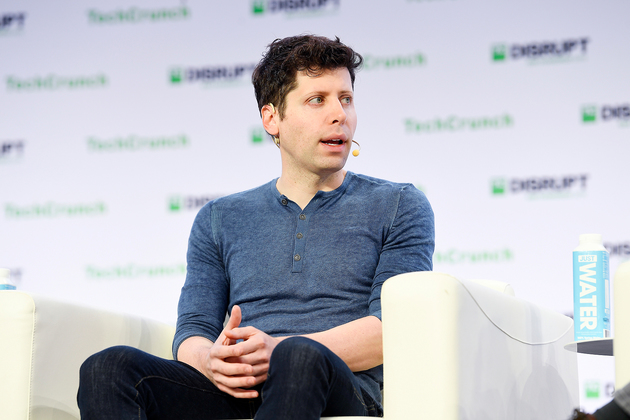
Photo/VCG
1. Altman returns to OpenAI headquarters after being ousted
On November 19 local time, Sam Altman posted a message on X: “This is the first and last time I wear these.” He had an OpenAI badge on his chest, but it said “Guest 04”. Sam is currently at OpenAI headquarters. OpenAI’s chief strategy officer Jason Kwon also posted a message, confirming that Sam had returned to OpenAI. It is reported that several OpenAI executives and investors are trying to restore Sam Altman’s CEO position, but they are deadlocked on the board composition and role issues. The decision to restore his position may be made soon, but the talks are still ongoing.
2. Germany, France and Italy reach AI regulation agreement, oppose excessive restrictions on technology development
According to a joint document quoted by foreign media, France, Germany and Italy have reached an agreement on how to regulate AI. The report said that the three governments support the “mandatory self-regulation through codes of conduct” for AI basic models, but oppose the “untested norms” for them. The agreement promises to only regulate AI applications and not the technology itself, and to sanction them only after finding out that AI applications have improper behavior. Foreign media expect that the agreement reached by Germany, France and Italy will speed up the negotiations at the European level and provide a blueprint for the European-level AI regulation guidelines.
3. Starship completes second flight test: successfully implements rocket separation, but still triggers self-destruct system in the end
On November 18 local time, SpaceX’s Starship conducted its second launch test. Although the “super-heavy” rocket booster exploded unexpectedly after separating from the Starship spacecraft, and the spacecraft subsequently lost contact and self-destructed, it took a step forward compared to the previous test. On April 20 this year, Starship conducted its first launch and ascent test in history, but after successfully taking off for 3 minutes, the rocket’s attitude problem occurred and it disintegrated and exploded in the air. SpaceX official statement said: “Congratulations to the SpaceX team for achieving exciting results in the second integrated flight test of Starship! Starship successfully ascended under the power of 33 Raptor engines of the super-heavy booster and completed the first and second stage separation smoothly.”
4. Meta bets on generative AI business, now splitting its Responsible AI team
On November 18 local time, Meta announced that it is splitting its Responsible AI (RAI) team and moving more resources to generative AI work. This is part of Meta’s extensive internal AI team reorganization plan this week. Meta spokesperson said that most of the RAI team members will move to the generative AI field and continue to support Meta’s cross-departmental work on responsible AI development and use; some other members will move to the AI infrastructure department. He pointed out that the company intends to make these employees closer to the development of core products and technologies.
5. Musk says X company investors will own 25% of xAI
On November 19, Musk said that X company investors will own 25% of xAI. This month, xAI company launched its first AI product Grok, which uses tens of billions of data points from public data for training, but it is not clear what data was used. xAI’s Grok AI assistant will be directly included in X platform’s Premium Plus, and existing X users can subscribe for $16 per month.
6. Japanese researchers use quantum technology to extend electric car range
According to foreign media reports, Japanese researchers have developed a quantum sensor that can extend the range of electric vehicles by about 10% by accurately measuring battery power. The technology is expected to be put into practical application in 2030. Tokyo Institute of Technology and auto parts manufacturer Yazaki Corporation jointly developed a high-sensitivity diamond quantum sensor. Traditional sensors usually measure the current size in units of 1 ampere, while the newly developed sensor measures in units of 10 milliamperes, with an accuracy of 100 times higher than before.
7. Apple Vision Pro headset to go on sale around March next year, report says
According to tech journalist Mark Gurman, Apple originally planned to launch its first headset device Apple Vision Pro in January 2024, but the company is still developing a distribution plan and conducting final device testing for the product. Apple officially said that Apple Vision Pro will go on sale in the United States early next year. Gurman said he now expects the device to launch around March.


 川公网安备 51019002001991号
川公网安备 51019002001991号





